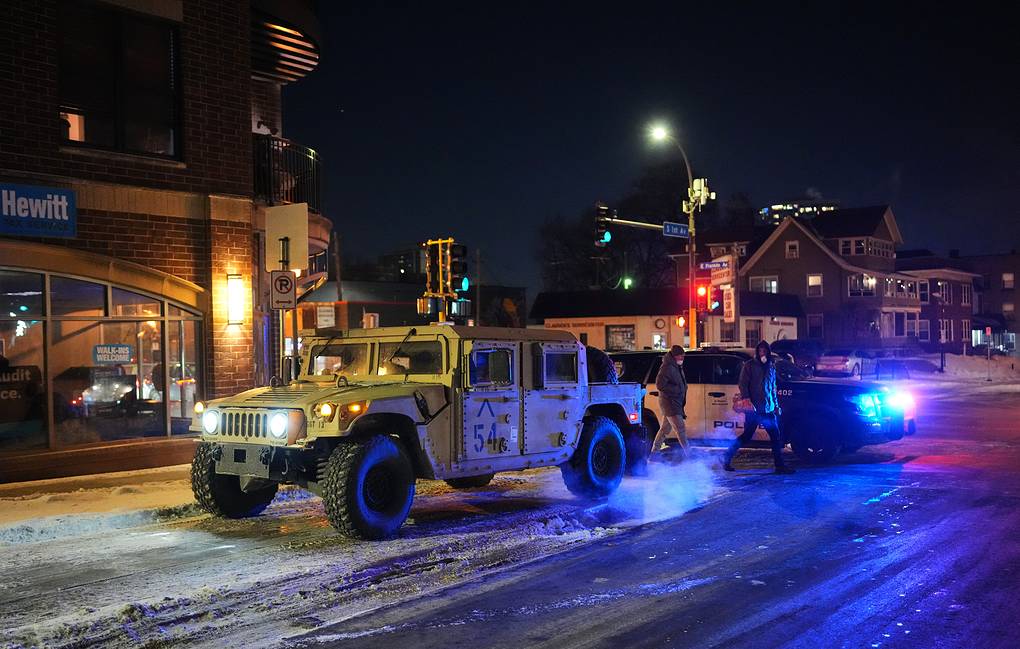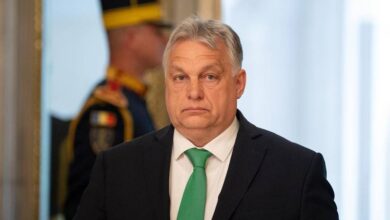Press review: US risk on Iran remains high and Minneapolis unrest may harm Trump admin
Top stories from the Russian press on Tuesday, January 27th
MOSCOW, January 27. /TASS/. Russia demands the UK and France join the nuclear disarmament process; the risk of another US attack on Iran remains high; and unrest in Minnesota may harm the Donald Trump administration. These stories topped Tuesday’s newspaper headlines across Russia.
Izvestia: Russia demands UK, France join nuclear disarmament process
A future document that would replace the New Strategic Arms Reduction Treaty (New START) must cover NATO’s overall capabilities, including the arsenals of France and the United Kingdom, Mikhail Ulyanov, Russia’s permanent representative to international organizations in Vienna, told Izvestia.
New START will expire on February 5. There is still no dialogue yet between Russia and the United States on extending the treaty, although Moscow suggested that the key limits established in the document be extended for at least a year, Ulyanov noted.
The lack of a new agreement increases risks on the international stage. Countries will continue to develop their nuclear forces based on expectations that their opponents are also likely to do so. If New START is not extended and no new treaty is signed, a long-term multilateral arms race with no limits would begin, Dmitry Stefanovich, researcher with the Center for International Security at the Russian Academy of Sciences’ Institute of World Economy and International Relations, pointed out.
"The United States will seek to deploy its nuclear forces and upgrade them because the Americans are nearing a large-scale nuclear rearmament, without regard for quantitative restrictions," said Igor Korotchenko, editor-in-chief of the National Defense magazine. According to him, Washington’s main goal is to break the nuclear parity with Russia, particularly based on the proposed strategic missile defense system dubbed the Golden Dome.
The US would worsen its strategic position by rejecting New START, Korotchenko believes. He has doubts concerning the implementation of the Golden Dome project because of technical difficulties and high costs. In the expert’s opinion, given the current level of technical progress, it will be impossible to establish such a system in the coming 25 years. Meanwhile, Russia has largely modernized its nuclear triad, bringing the level of advanced weapons in its Strategic Missile Forces to 90%. As for the US, it has yet to conduct a major upgrade.
Izvestia: Risk of another US attack on Iran remains high
The Pentagon is increasing its military presence in the Persian Gulf. The risk of a US attack on Iran remains very high, said experts interviewed by Izvestia.
"An attack is possible," Kamran Gasanov, doctor of Political Science at the University of Salzburg, noted. "Behind closed doors, Washington must be issuing ultimatums to Tehran concerning its ballistic missile and nuclear programs, demanding they be halted. However, Iran is not abandoning these projects, which means that the possibility remains of more US strikes," he elaborated.
Last summer, the US mostly targeted Iran’s nuclear sites, but now the list of potential targets may broaden. According to Gasanov, Iran’s air defenses, aircraft, headquarters, and even its political leadership may come under attack, along with strategic infrastructure facilities such as power stations, oil and gas fields, maritime communications, tankers, and other vessels.
"Donald Trump will try to stir up the Iranian elite, creating a rift between reformists and hardliners," Gasanov suggested. "He also expects to cause a humanitarian crisis in order to spark another attempt at revolution," the expert added.
However, Tehran won’t sit idly by. Political scientist Ilgar Velizade believes that Iran could carry out strikes on US facilities in the Middle East, as well as on Israel.
If the United States opts for an escalation of violence, the level of distrust in Washington will increase in the region, experts said. "However, Arab nations are unable to offer serious resistance in the short term. They won’t fight the US and Israel over Iran," Gasanov pointed out.
"Tehran remains relatively isolated in the region. Few countries are willing to openly side with Iran. They may express sympathy and regret, but this kind of political rhetoric will affect neither the balance of power in the region nor the position of key US allies, namely Saudi Arabia and Qatar," the political scientist concluded.
Media: Minneapolis unrest may harm Donald Trump administration
Unrest is gaining momentum in the United States amid President Donald Trump’s fight against immigrants. Protests against the White House deportation policy intensified in Minnesota after police officers fatally shot two activists. Experts interviewed by Izvestia believe that the unrest may well spread to California, New York, and Illinois.
Democrats have already decided to take advantage of the crisis in order to strengthen their political fight against the White House administration. According to media reports, the Democratic Party’s complaints about funding for the Department of Homeland Security (DHS) have increased the likelihood of a partial government shutdown in the US.
If Congress fails to approve the federal budget by February 1, the US government will once again suspend its operations, as it did last fall, American studies expert Malek Dudakov pointed out. "The shutdown will affect the DHS agencies that carry out deportation raids. It will certainly be a serious blow to Trump, particularly amid protests," the political scientist believes.
The Minnesota tragedy poses a problem for Trump, Pavel Dubravsky, head of Dubravsky Consulting, told Vedomosti. He explained that voters cast their ballots driven by emotions. Most Americans don’t support the Immigration and Customs Enforcement (ICE). What exacerbates the problem is that the Trump administration has been unable to conduct an effective information campaign and adequately react to its own mistakes.
According to Dubravsky, Trump has so far succeeded in withstanding pressure from society, but no one can say if he will continue to do so as the November 2026 mid-term congressional elections draw closer. "Gallup surveys show that independent voters are slowly drifting towards the Democratic Party. The main reason lies in Trump's economic policy, but the Minnesota situation has also contributed to the trend. Domestic developments are far more important for Americans than those in Greenland and Venezuela," the expert emphasized.
Rossiyskaya Gazeta: EU approves ban on Russian gas supplies
The Council of the European Union has approved a plan to phase out Russian gas imports. First, liquefied natural gas (LNG) supplies will end on January 1, 2027. A ban on Russian pipeline imports will take effect on September 30, 2027, Rossiyskaya Gazeta notes.
Ivan Timonin, project manager at the Implementa company, points out that Russia had started redirecting export flows long before the EU formally made the decision. This is clear from the export structure. Russian LNG supplies to the EU dropped by more than three billion cubic meters in 2025, while exports to China rose from 9.6 billion to 10.5 billion cubic meters, and exports to Japan stayed stable. Another important factor is that the LNG market is much more flexible than pipeline gas supplies, and if there is demand and logistics capacity, export flows can be redirected quite quickly, the expert stressed.
As for pipeline deliveries, the Power of Siberia pipeline that connects Russia and China has reached its installed capacity, and a Far Eastern route with a capacity of ten billion cubic meters of gas is expected to be launched in 2027. In addition, Russian gas supplies to Central Asian countries are expected to grow.
According to National Energy Security Fund Deputy Director Alexey Grivach, the redirection of export flows to the east will gain pace. Moreover, in the expert’s view, the situation is not final regarding western-bound exports because some countries are unhappy that the decision on trade restrictions did not take their opinion into account, so they plan to challenge it in court.
As for LNG exports, Timonin believes that given expectations of growing global demand, the loss of the European market does not mean a reduction in Russia’s exports, as developing Asian markets will largely "absorb" gas.
That said, the EU’s ban is not just changing the geography of exports but also reshaping the entire architecture of the gas sector because LNG supplies mean flexibility and access to the global market, while eastern-bound pipelines, including the Power of Siberia, are becoming the foundation for long-term monetization of the resource base. These are not competing but complementary elements of a new export strategy, Timonin maintained.
Media: Geopolitical risks keep pushing precious metals prices upward
Precious metals prices continue to grow rapidly. The price of gold on the spot market has surpassed $5,000 per troy ounce, and the silver price has exceeded $100 per ounce. The platinum rate has hit an all-time high, and the price of palladium has reached the highest level since September 2021. Analysts expect prices to keep rising, Kommersant writes.
The soaring prices of precious metals stem from the active formation of a new world order. Since the beginning of the year, the US has carried out operations in Venezuela and Syria and deployed an aircraft carrier strike group to the Middle East to put pressure on Iran. In such a situation, global investors are increasing investments in precious metals.
Sovcombank Chief Analyst Mikhail Vasilyev does not rule out that the gold price could rise to $5,500 per troy ounce in the coming months. "Geopolitical contradictions may increase as the November midterm congressional elections in the US approach. In this regard, another round of tensions between Washington and Beijing is possible," the expert noted.
Rising geopolitical tensions in various parts of the world are what drive precious metals prices up, experts interviewed by Vedomosti agree. Meanwhile, the dollar is weakening against the majority of major currencies, supporting prices, Finam analyst Alexander Potavin pointed out. Another fundamental factor is that central banks continue active gold purchases, said Vitaly Manzhos, stock market expert at BCS World of Investment, and Eduard Lysenker, director of S+ Consulting.
Maxim Shaposhnikov, advisor to the Industrial Code fund manager, believes that the gold price will stabilize after reaching the $5,600-5,800 mark later in 2026. In his opinion, the price is unlikely to climb to $6,000 per troy ounce or higher, but it may be possible amid "geopolitical chaos."

